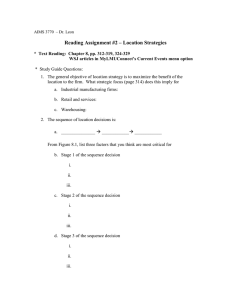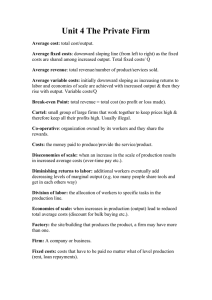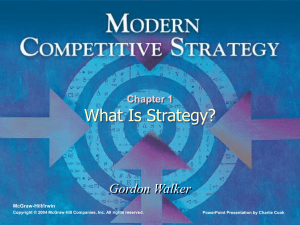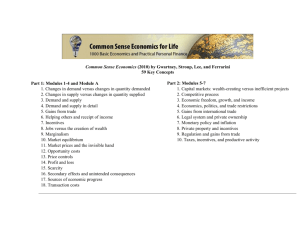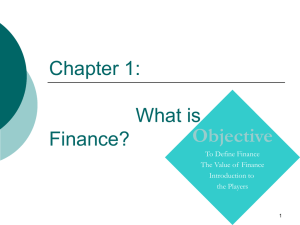Peter J. Hammond Financial Distortions to the Incentives
advertisement
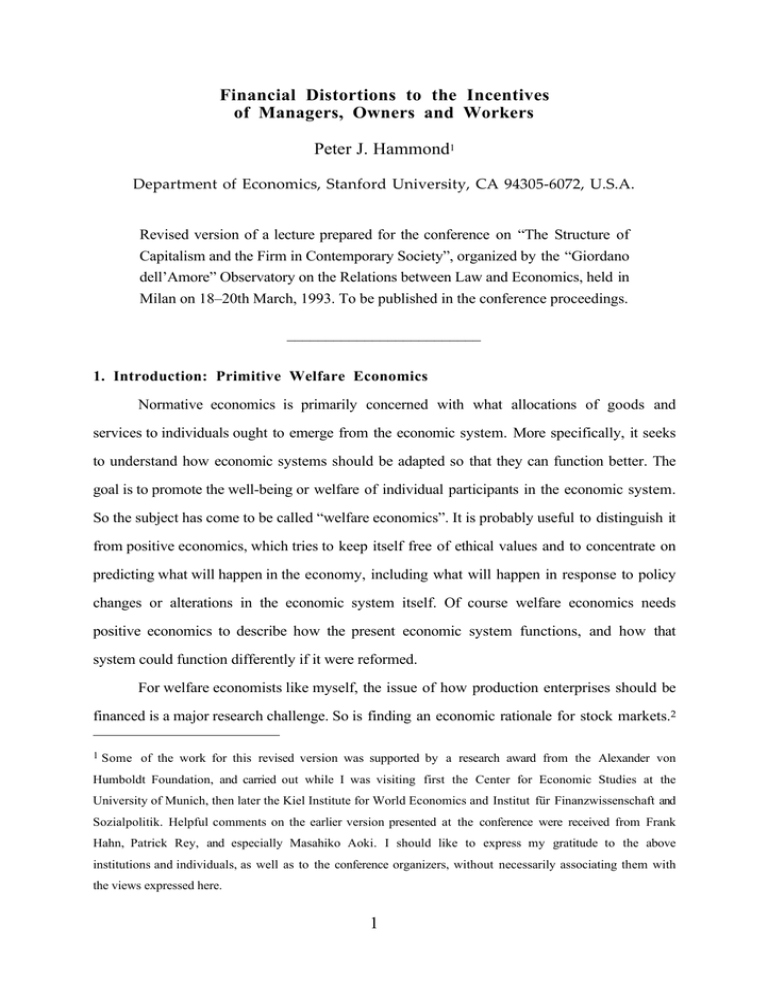
Financial Distortions to the Incentives of Managers, Owners and Workers Peter J. Hammond1 Department of Economics, Stanford University, CA 94305-6072, U.S.A. Revised version of a lecture prepared for the conference on “The Structure of Capitalism and the Firm in Contemporary Society”, organized by the “Giordano dell’Amore” Observatory on the Relations between Law and Economics, held in Milan on 18–20th March, 1993. To be published in the conference proceedings. _________________________ 1. Introduction: Primitive Welfare Economics Normative economics is primarily concerned with what allocations of goods and services to individuals ought to emerge from the economic system. More specifically, it seeks to understand how economic systems should be adapted so that they can function better. The goal is to promote the well-being or welfare of individual participants in the economic system. So the subject has come to be called “welfare economics”. It is probably useful to distinguish it from positive economics, which tries to keep itself free of ethical values and to concentrate on predicting what will happen in the economy, including what will happen in response to policy changes or alterations in the economic system itself. Of course welfare economics needs positive economics to describe how the present economic system functions, and how that system could function differently if it were reformed. For welfare economists like myself, the issue of how production enterprises should be financed is a major research challenge. So is finding an economic rationale for stock markets.2 1 Some of the work for this revised version was supported by a research award from the Alexander von Humboldt Foundation, and carried out while I was visiting first the Center for Economic Studies at the University of Munich, then later the Kiel Institute for World Economics and Institut für Finanzwissenschaft and Sozialpolitik. Helpful comments on the earlier version presented at the conference were received from Frank Hahn, Patrick Rey, and especially Masahiko Aoki. I should like to express my gratitude to the above institutions and individuals, as well as to the conference organizers, without necessarily associating them with the views expressed here. 1 This question seems especially relevant, not just for this conference, but also because many economists, business people, and ordinary investors have claimed of late to be dissatisfied with the way in which stock markets seem to function. Many commentators also complain about the fact that stock markets appear to provide incentives for investors to concentrate on short-run returns, even if that means sacrificing a firm’s long-term profitability or value to society. Actually, Edmund Phelps, in his presentation to this conference, suggested that shareholders may have longer horizons than managers. The reason he advanced is that, though shareholders may care only about short-run returns, these include capital gains that reflect likely payments for the entire future life of the firm. Whereas current managers care only about the period for which they expect to retain control. This argument is compelling when different shareholders hold unanimous views about “fundamentals” — i.e., about what the firm’s future earnings will be, and about how these earnings should be valued. In realistic situations, however, shareholders know that they are likely to have different opinions of these fundamentals. This encourages them to consider only the returns that accrue before they expect to sell their shares when they think that the the firm has become too overvalued relative to their own perception of its fundamentals. Moreover, as Luigi Guatri pointed out in the conference, this horizon problem and similar concerns have even led some U.S. business school academics such as Michael Jensen and Michael Porter to write respectively of “The Eclipse of the Public Corporation” and “Changing the Way America Invests in Industry.” Of course, I am also aware of the remarkable recent revival of interest in the organizational theory of the firm. This harks back to the early work of Ronald Coase, but has been revitalized by such younger writers as Oliver Williamson.3 Yet by and large these writers 2 For an especially forceful questioning of the role of the stock market in the economic system, see Susan Strange, Casino Capitalism (Oxford: Basil Blackwell, 1986). The similarity of the stock market to a casino was pointed out by John Maynard Keynes, General Theory of Employment, Interest and Money (London: Macmillan, 1936, p. 159). 3 See, for example, Oliver E. Williamson, The Economic Institutions of Capitalism (New York: The Free Press, 1985), and the selection of articles published in Oliver E. Williamson and Sidney G. Winter, The Nature of the Firm: Origins, Evolution, and Development (New York: Oxford University Press, 1991). 2 follow Williamson, who states frankly that “Key legal features of the corporation — limited liability and the transferability of ownership — are taken as given.”4 Nor has it usually been noticed that there could be limited liability and transferability of ownership even without a stock market, provided that firms could be bought and sold as a whole, or in large fractions, as indeed shops or professional partnerships often are. Finally, at the time of this conference, a lot of attention was being paid to the privatization of state-owned enterprises in the regions of Eastern Europe and the former Soviet Union that had been under communist rule. An important issue is whether and how to set up stock markets for shares in such enterprises. Before facing such challenging issues in the complex world of modern reality, let me go back to a pristine, almost primitive, economy before the industrial revolution — perhaps even before Adam Smith’s pin factory had started to make good use of the division of labour within any kind of large scale production enterprise. This largely imaginary primitive economy has plenty of farmers, of course. But also carpenters, masons, potters, smiths, weavers, wrights, and other artisans whose occupations have often become surnames. All these producers use inputs to generate outputs, just as modern firms do. But unlike most modern firms, these producers are individual consumers and workers who are also their own managers. They may employ some other workers as well, but at most a few whose activities are therefore easily monitored. All the profits accrue to the one owner-manager of the business — so do any losses which the owner has the financial resources to cover, up to the point where his wealth is entirely exhausted. The firm is financed by this owner-manager, or perhaps by debt if the owner-manager is able to borrow. But defaulting debtors are liable to imprisonment, or at least to having all their personal assets seized. There is no limited liability. The lone owner-manager faces a “hard” budget constraint. This is in contrast to the “soft” budget constraint which 4 Williamson, op. cit., p. 274. Nevertheless, for exceptions see p. 307 of this same book, as well as the same author’s work discussed in Section 5.4 below. 3 allows indebted firms and their managers to be bailed out by the government, especially in the case of publicly owned enterprises.5 2. Three Theorems of Welfare Economics Of course, even if such an economy with self-financed and owner-managed small firms ever existed in the past, it is certainly no longer close to modern reality. But it is the ideal on which much economic theory appears to have been based, even recently. Moreover, as far as I can see, it is only within this theoretical ideal that Adam Smith’s invisible hand can be expected to work properly, so that complete competitive market outcomes are fully Pareto efficient — meaning that nobody can be made better off without taking resources away from somebody else in a way that makes them worse off. This efficiency property of complete competitive markets is the first efficiency theorem of welfare economics. Pareto efficiency, however, does not rule out dictatorship, extreme inequality, widespread poverty, or even mass starvation. For this reason the second efficiency theorem of welfare economics may be more interesting, since it says that any Pareto efficient allocation, including any allocation that accompanies efficiency with some acceptable degree of distributive justice, can be achieved through a system of complete perfectly competitive markets. At least, this is true provided some other technical conditions of continuity, convexity, non-oligarchy, etc. are all satisfied. To decentralize Pareto efficient allocations in this way, it is essential that the complete market system also allows enough of those costless “lump-sum” redistributions of wealth or purchasing power which are required for distributive justice. For the purposes of this lecture, however, it has to be pointed out once again that only within the theoretical ideal of an economy with self-financed and owner-managed small firms is the second efficiency theorem generally true. Even then, it is likely to be impossible in practice to arrange a suitable costless redistribution of wealth of the kind which the theorem postulates. One particularly important reason is that usually individuals have private information about 5 About which Janos Kornai has written extensively — see, for instance, Growth, Shortage, and Efficiency (Oxford: Basil Blackwell, 1982). 4 their own abilities and other endowments. Then individuals will typically want to make these endowments appear small, so that the economic system will expect less from them and provide more in return. Of late, therefore, it has seemed to me that a third welfare theorem is much more interesting than either of the first two that were briefly summarized above. This is one that extends some well known propositions on the gains from international trade, and from the replacement of so-called distortionary taxes on purchases or sales of commodities or on labour income by non-distortionary or lump-sum taxes on individuals. The third theorem states that any reform which enables producers who adapt their production plans suitably to earn higher profits than they did previously can serve as the basis of a reform making all consumers better off. What is required, however, is some way of distributing the extra profits between consumers so that none loses and all gain. In the “classical” version of the third theorem, these gains rely on lump-sum transfers from gainers to losers. As with the second theorem discussed above, the problem is that individuals with private information can manipulate any such transfer system so that they appear to have losses that need to be compensated, even if in fact they do not. In theory it is just possible to avoid such manipulation by freezing the prices paid by consumers for goods and services, as well as the wages received by workers and the dividend payments to owners of firms. Prices paid to and by producers, however, are free to vary in order to clear competitive markets, with the differences between consumer and producer prices being maintained through commodity, income, and dividend taxes or subsidies. The gains can then be distributed to consumers by means of a uniform poll subsidy which is paid to all individuals regardless of their circumstances, even if no other more appropriate method can be found.6 Once again, however, for the purposes of this lecture it is necessary to question the relevance of this third theorem except within the theoretical ideal of an economy with selffinanced and owner-managed small firms. 6 For the analytical basis of this claim, see my paper with Jaime Sempere, “Limits to the Benefits from Market Integration and Other Supply-Side Policies,” European University Institute Working Paper ECO No. 92/79. 5 3. Financial Utopia So here at last are some fundamental questions which seem rarely to have been addressed by economists in the past: What is the ideal system of corporate finance? Would we be better off if trading on stock exchanges were severely limited, thereby forcing investors to consider returns much further into the future? Is there even a case for abolishing stock markets altogether? It may well be objected that I am seeking some kind of unattainable financial utopia. As you probably know already, the original Utopia was written in Latin by the English saint and martyr, Sir Thomas More. It appeared during 1517, well before the industrial revolution or the development of extensive capitalist enterprise. A very different version of Utopia was provided, in one of their most obscure works, by William Gilbert and Arthur Sullivan. Their operettas have amused Anglo-Saxons for more than a hundred years, but will never be performed at the Teatro alla Scala, I am sure. By the time of the Victorian era in which they wrote, Utopia had become a limited liability company. Its owners seem to have faced the ultimate in soft budget constraints. This is illustrated in the extract that is reproduced in the appendix.7 If there were perfect information, the complete perfect market ideal discussed in Section 1 could indeed be achieved by means of a form of financial Utopia. The sole owner-manager of each firm would be free to borrow whatever was needed for his production activities, subject to the natural constraint that more could never be borrowed than what the producer could certainly afford to repay, even in the worst case where maximized profits fall to a minimum because the firm experiences terrible misfortune. Where there are entirely exogenous risks such as theft, flood, fire, or storm, complete markets allow the firm to purchase insurance against these 7 The relevance of this extract was also appreciated in Leslie Hannah, The Rise of the Corporate Economy (London: Methuen & Co Ltd, 1976). This same book, particularly ch. 5, deserves special mention as an interesting historical explanation of how stock markets rose to prominence in the British economy. Yet it offers no convincing theoretical justification beyond the need of capitalists to tap new sources of finance once the gross inequality in the personal distribution of wealth had begun to decline somewhat. 6 hazards. Nor are business risks enough to upset the efficiency properties of complete market allocations. For complete markets should also include forward markets on which the firm can remove the risk of unfavourable price changes. So in the end the only uninsurable risk that remains is that the manager himself will make some mistake. Or that some of his employees for whom he should be responsible will err. Yet one can well argue that it is not really appropriate to allow this risk to be insured, since having managers bear the full cost of any mistake is surely part of a desirable incentive system. So, of course, is having them reap the full benefit of any especially good performance. This vision of financial utopia has some problems, needless to say. Of these, the first is that it may simply be impossible to impose the full cost of severe mistakes on owner-managers. For a mistake that is severe enough can leave the firm unable to repay its debts, no matter how well it performs later on. If the consequences of defaulting on a business loan are severe enough, however, such mistakes will certainly be avoided by competent managers, so the problem will not arise in any reasonable kind of equilibrium. A second problem is much more serious. This is that in fact there will always be some private information belonging to the owner-manager which affects the most that his firm can afford to repay, given each possible future course of events. For instance, if the penalty for a defaulting debtor is the attachment of a proportion of all future earnings, this will have the same effect as an income tax that distorts the owner-manager‘s choice between labour and leisure in future periods. Moreover, somebody who is anyway likely to go very deeply into default will be tempted to pursue wildly risky and desperate schemes. This is because all losses will be borne by others once the manager’s maximum possible amount of repayment has already been exceeded, whereas the manager could still gain by avoiding default altogether in the unlikely event that the wild scheme succeeded. The crisis of the Savings and Loan Institutions in the United States had much of this flavour. For the managers of those institutions were having to pay interest to depositors at high short-term rates, while receiving much of their income from 7 long-term mortgages that had been lent out previously at rather low fixed rates. As Shakespeare wrote in Hamlet, “borrowing dulls the edge of husbandry.” For such reasons, loan markets are all too likely to be plagued with “adverse selection”, meaning that some kinds of high interest loan contract will attract precisely the kind of desperate borrower who is least likely to be able to repay. And loan markets are also plagued with “moral hazard”, if only because desperate borrowers are encouraged to undertake very risky schemes in order to maximize the probability of avoiding default, without paying any attention to the likely cost of such schemes in the likely event that default eventually occurs. Because both adverse selection and moral hazard are inevitable, at least in realistic loan markets, credit will often be rationed — implying that firms will typically face borrowing constraints which really do limit their investment opportunities from time to time. Moreover, the tightness of these borrowing constraints for any particular firm will clearly depend on the amount of collateral that the owner-manager is able and willing to offer, and not just on the present discounted value of what he can afford to repay in the worst possible future his firm can face. 4. Financial Distortions from Share Contracts Thus private information concerning each firm’s future ability to repay its debts is bound to create imperfections in credit markets.8 It is also inevitable that different lenders will find themselves sharing the burden when a firm which has borrowed from them fails to repay. But it is by no means inevitable or desirable that any financiers should share the benefits when the firm succeeds. In other words, there is so far no justification for any kind of share contract, let alone for a stock market in which shares can be bought and sold. Indeed, economists have understood the disadvantages of share contracts from the time when Alfred Marshall’s work was published, if not before. For efficient production requires that the marginal benefit of any input, as measured by the extra revenue it produces from 8 For a more formal justification of this claim, see my “On the Impossibility of Perfect Capital Markets,” in P. Dasgupta, D. Gale, O. Hart, and E. Maskin (eds.), Economic Analysis of Markets and Games: Essays in Honor of Frank Hahn (Cambridge, Mass.: M.I.T. Press, 1992), pp. 527–560. 8 increased output, be equated to the marginal cost of supplying that input. A farmer who receives the full market value of what he grows will tend to do this. But suppose instead that a farmer rents a plot of land according to a share-cropping contract, with half the output going to the tenant and half to the landlord. Then a profit maximizing farmer will equate only half the marginal benefit of each input to its marginal cost. This tends to imply that marginal benefit is higher and marginal cost lower than for an efficient farmer. Indeed, except in the case of a rare and weird corner solution, either marginal cost or marginal benefit, or both, must change. Thus the standard efficiency conditions will no longer be met. And a similar inefficiency will arise whenever the fraction of the crop received by the tenant farmer is less than one.9 Such inefficiencies are not confined to sharecropping farmers, of course. They arise whenever a firm’s single owner-manager, who receives the full marginal profit of any management decision he makes, is replaced by a group of owner-managers forming a partnership which shares out the marginal profit. One particular form which such a partnership can take is a worker-owned cooperative. The incentives for managers to exert full effort in order to maximize the partnership’s profit always get blunted by such a sharing arrangement. Of course the same is also true of a single owner-managed firm when one or more governments take a share of its marginal profit through their tax systems. Share contracts, however, reinforce the distortions already created by taxation. And the distortions due to share contracts seem harder to justify than those due to unavoidably distortionary tax systems. There may be even more distortions created by share contracts when the set of partners is likely to change over time. For existing partners who know that they are likely to retire or to leave the firm in the near future will of course be tempted to pay out extra large dividends and other short term benefits, even at the expense of the firm’s long term financial health. One may call this the “horizon problem” since its root cause is the divergence between the short time horizon of existing partners and the (possibly much) longer time horizon of the firm itself. At first sight, it might seem that a single owner-manager would share the same horizon problem. 9 Actually, an interesting exception to this general proposition is the kind of corner solution in a model of fixed coefficients that was discussed in Pradeep Agarwal, Sharecropping and Financial Markets in Developing Countries, Ph.D. Thesis, Department of Economics, Stanford University, 1987. 9 However, such an owner-manager is much more likely to be planning to sell the business entirely when he retires or moves onto something else. Then the firm’s future prospects are likely to be reflected in the selling price, so that the existing owner would lose by sacrificing the future financial health of the firm unduly. Whereas senior partners may be more inclined to dump future problems onto their younger partners’ shoulders. Most modern corporations have a large number of shareholders, not all of whom are managers. This creates an additional problem because responsible individual shareholders will find it necessary to devote some effort to monitoring and motivating management. Yet the returns to any such effort accrue to all shareholders, whether or not they contribute to this collective effort. This creates what economists call “a public good problem” of private costs being used to create widely dispersed benefits, with each individual shareholder being tempted into “free-riding” at the expense of all other shareholders. That is, most shareholders will not participate in the effort needed to keep management on its profit-maximizing toes, and those who do will not put in as much effort as would be desirable. This is how managerial slack can easily arise, and is also a reason why executive salaries may be unreasonably high in some cases. In the case of firms facing imminent failure, other financial distortions may arise from share contracts, and from the allocation of risk between the holders of bonds and of shares. For bond holders’ returns are affected by what happens to the firm’s profits in case their claims cannot be met in full. Each million lira less profit (or additional loss) comes out of what they will recover when the firm is liquidated. So bond holders will be interested in continuing to support the firm, possibly even with new lines of credit, if this leads to a much greater chance that financial health will be restored and all debts repaid in the long run. But unlike shareholders, they are totally uninterested in increasing profit in those circumstances where the firm survives and repays all its debts in full. Thus the objectives of bond and share holders conflict in a fundamental way. Bond holders worry about the risk of failure, but care nothing for great success. Whereas shareholders look for chances of fat profits, but care nothing for extra losses when the firm is going to fail anyway. Neither group wants to maximize the 10 expected profit of the firm. Only a mixed creditor-shareholder, holding exactly equal proportions of the firms’ debt and its equity, wants to do this in general.10 In the end, therefore, share contracts do indeed distort the incentives of both managers and owners. Also those of workers in any situation where they are given some power to affect collective decisions determining the firm’s future. Some compensating gain from share contracts must therefore be sought if we are not to dismiss all such contracts as simply irrational. 5. Excuses for Share Contracts 5.1. Risk Shedding One common excuse for having share contracts is that the owner-manager of a firm, or the tenant on a plot of agricultural land, is able to shed some of the risk that arises in his business.11 Yet I have already argued that risks which are exogenous to the firm can and should be covered through complete insurance markets and forward contracts. Of course, both insurance and forward markets appear to be seriously incomplete, so this prescription is impractical. Still, one is bound to ask why more such markets do not spring up to replace the stock markets which appear to have such undesirable effects on incentives. In the end, one can well understand why an individual owner-manager would want to shed some risk by passing it onto others through selling share contracts. But this could be done by creating partnerships instead of issuing shares that can be bought and sold so freely. And nobody I know has come up with a convincing reason to explain why risk shedding should be allowed to distort incentives. 10 For an extensive analysis of the differing incentives for creditors and shareholders holding assets in a firm already in financial distress, or likely to become so in the near future, see Jean-Daniel Guigou, La BanqueActionnaire dans l'Allocation et le Contrôle du Capital Social, doctoral thesis, University of Nice, 1993. 11 See, for instance, Joseph Stiglitz, “Incentives and Risk Sharing in Sharecropping,” Review of Economic Studies, 41 (1974): 219–256; David Newbery, “Risk Sharing, Sharecropping and Uncertain Labour Markets,” Review of Economic Studies, 44 (1977): 585–594; Avishay Braverman and Joseph Stiglitz, “Sharecropping and the Interlinking of Agrarian Markets,” American Economic Review , 72 (1982): 695–715. 11 5.2. Anti-Usury Laws Laws prohibiting the payment of interest flourished in medieval Europe, and survive to this day in various Moslem countries. They leave little alternative to share contracts if financiers are to be rewarded for their services. Such laws may help explain the origins of share contracting. But today it is hard to find any secular justification for laws that prohibit paying interest at the usual market rates for corporate loans in contemporary advanced economies. An interesting issue is whether there are any reasons why such anti-usury laws should be instituted in the first place. Presumably some entrepreneurs who had gone into debt found themselves receiving sympathy because of harsh treatment by grasping money-lenders — as can happen to this day in “unofficial” loan markets, especially in “less developed” economic systems. A share contract limits the liability of a failed entrepreneur to the amount he can afford to repay in a way that a debt contract does not. Yet limited liability laws can serve exactly the same function. Like share contracts, in a failing firm they weaken incentives to reduce losses, but in a successful firm they do not weaken incentives to increase profits. 5.3. Indivisibilities and Portfolio Risk Spreading Owner-managers can reduce the riskiness of their portfolio by issuing shares. Other investors can reduce the risk of not owning shares in successful firms by buying them in the stock market. It would be better in principle to have these investors own and manage small replicas of each firm whose shares they own, since then incentives would be fully preserved. But obvious transactions costs and indivisibilities make it impossible for each share owner to create such replicas. Transactions costs also prevent the setting up of sufficiently extensive forward markets, including markets for capital goods which are specific to particular firms, of a kind that would make stock ownership unnecessary. Indeed, the investors in a particular firm’s stock may simply desire substitutes for missing markets in the products of that firm. Another possibility would be to create a “shadow” stock market, with securities whose returns are indexed to the dividends of particular firms. However, with these shadow markets, a firm would not be required to pay dividends to outside shareholders, since that would 12 weaken incentives. Instead, there would be matching payments from the organizers of the security markets. The problem, of course, is that it is not clear where the funds to make such payments could be found, except among the firms which determine what dividends they can afford to pay. 5.4. Reduced Internal Transactions Costs The recent literature on reducing transactions costs within the firm has not always paid attention to financial decisions. A major exception is an important article by Oliver Williamson.12 He points out how debt contracts require that: (1) interest payments be made regularly; (2) liquidity tests be passed repeatedly, in order that the credit be maintained; (3) the principal sum be repaid when the loan expires; (4) debt holders have pre-emptive claims in the event of default. Thus debt contracts involve a lot of rigidity, and allow debt-holders a lot of control over the financial future of the firm, especially if it seems likely that financial difficulties lie just around the corner. Equity avoids many of these rigidities, but involves greater set-up costs, such as a board of directors, etc. Thus the theory of “transactions cost economies” treats debt as natural, but equity as “the financial instrument of last resort.”13 Debt involves rules, and is the cheaper option for unspecific assets that are easier to resell or redeploy. Equity, on the other hand, buys the chance to use discretion, and is the cheaper option for firm-specific assets that are difficult to resell or redeploy. Of these four excuses — risk shedding, avoiding usury laws, risk spreading, and reduced internal transactions costs — all except the second can be regarded as both respectable and relevant to the modern Western world. None of the four, however, goes very far toward explaining why we must have stock markets with extensive retrading instead of partnerships whose shares are quite illiquid. Stock markets need some other kind of excuse. 6. Excuses for Stock Markets 12 Oliver E. Williamson, “Corporate Finance and Corporate Governance,” Journal of Finance, 43: 567–591. 13 Williamson, op. cit., p. 581, with the emphasis of the original. 13 6.1. Trading Second Hand Capital and Corporate Control One claimed role for stock markets is to allow entire companies to change hands. This happens when more efficient managements buy control of the firm through the stock market, paying a price above what the firm had been worth under its previous less efficient management. Yet partnerships can also change hands without having any shares quoted on a stock exchange. Also, when it is an entire company whose control is to be changed, why have a market for partial shares in that company? 6.2. Keeping the Score Another claimed function of the stock market is to value companies, and let management know how well it is pleasing investors. Good performance should enhance stock market value. Yet keeping the score in this way is supposed to be the function of accountants and financial analysts. Indeed, it is their reports which investors typically use to value the company anyway. Thus, except to the extent that there is (illegal) trading by insiders who know more than the firm’s accountants, the stock market merely reflects signals of the firm’s value rather than itself providing that signal. The stock market does provide a way for competent financial analysts to reap the rewards of remaining well informed.14 Yet more direct incentive payments to financial analysts by potential lenders could surely achieve similar benefits, without the large ancillary costs of stock markets. 6.3. Exploiting the Psychology of Gambling Bonds can be boring, unless they are long-term in an era of volatile interest rates. People love lotteries. Even some house sellers have been discovering how it is possible to earn more by selling lottery tickets whose prize is the house rather than the house itself. The key is that the maximum loss should be small — the price of the ticket. But the maximum reward should be large. Shares in a new firm which may have huge potential meet these requirements, 14I owe this point to Patrick Rey. 14 of course, and so attract a certain type of adventurous capitalist. And when the British government chose to sell off shares in previously nationalized industries, the success of the sales probably owed more to similar motivations than to a real desire to hold a portfolio of shares. 6.4. Liquidity The best excuse for stock markets, however, is probably that they provide liquidity for investors. A venture capitalist who helps a firm get started knows that, if the firm matures and provides more certain but lower expected returns, he can sell out fairly easily and move on to another venture. Those who buy the venture capitalist’s shares are similarly assured that there will be a market for them later on. A risky market, of course, with possibly volatile prices. But such shares can be incorporated in a diversified portfolio whose components can be changed frequently. So it might be thought that stock markets could help firms finance desirable investments. Yet it should be pointed out that during the 1980s, U.S. corporations as a whole did not use stock markets to raise capital; instead, they created debt in order to finance the repurchase of tens of billions of dollars worth of shares. Of course, the firms that went in for such repurchases tended to be larger and older; many newer and smaller firms continued to use the stock market in order to help increase their financial capital. 6.5. Gains from Trading Stock Most economists see only gains from creating additional trading opportunities. So, if share contracts are to be allowed because of the financial benefits they bring about, why not allow such contracts to be exchanged? Do the gains from trade not extend to stock exchanges and markets for other financial assets? In fact, as I argued toward the end of Section 2 above, the standard gains from trade arguments have limited applicability even for ordinary commodity markets. For there to be legitimate gains from trade, compensation must at least be paid to the most deserving among 15 those who would otherwise lose the most. In the case of additional stock markets, such compensation is likely to be particularly difficult to arrange. This is because holders of existing financial assets who experience capital losses when new markets open also need compensation.15 Other problems arise because of moral hazard. We have already noticed how somebody who dilutes his share of the firm he owns and manages will face weakened incentives. Creating stock markets evidently allows such dilution — indeed, it is usually the reason for creating them. So any gains from trade need to be weighed against the costs of weakened incentives. Indeed, this seems to be yet another instance of how allowing free trade can tighten incentive constraints, so producing an inferior outcome.16 Finally, the gains from trading stock may themselves be entirely illusory. For they may merely represent perceived benefits to individuals which arise entirely from divergent expectations, rather than from differing needs or tastes. As such, they are just like the gains from exchanging bets on a horse race when different punters have different views of which horse is likely to win. Ex-ante, all punters presumably feel better off. Ex-post, many lose, and only the bookmakers and tax-collectors can expect to gain systematically. Naturally, gains from reallocating risk can remain even if expectations of different firms’ prospects are all held in common. Nevertheless, what remains unclear is whether the benefits to financiers of liquidity, as well as the general benefits of the freedom to trade stock, justify the rather large costs of having contemporary stock exchanges, with financial experts, portfolio analysts, salesmen, complicated computer equipment, etc. Something rather simpler, with daily or weekly auctions of no longer wanted shares, might serve our real needs just as 15For a fuller analysis, see ch. 5 of Jaime Sempere, Limits to the Third Theorem of Welfare Economics, Ph. D. dissertation submitted to the European University Institute, 1993. 16See also my paper “Markets as Constraints: Multilateral Incentive Compatibility in Continuum Economies,” Review of Economic Studies, 54 (1987): 399–412, as well as C. Blackorby and D. Donaldson, “Cash versus Kind, Self-Selection, and Efficient Transfers,” American Economic Review, 78 (1988): 691–700, as well as R.J. Arnott and J.E. Stiglitz, “The Basic Analytics of Moral Hazard,” Scandinavian Journal of Economics, 9 0 (1988): 383–413. 16 effectively. Nor can I see any very strong arguments against significant turnover taxes, as ways of encouraging longer term commitments by shareholders. 7. Tentative Conclusions If what I have said is at all close to being correct, the true benefits of stock exchanges are rather limited. They provide liquidity, and enable investors to share the benefits of large scale enterprise. But to do this would seem to require much less trading than we see in practice. Where stock exchanges exist already, they really do seem to have many features of casinos — except that they tend to be more complicated and interesting. In the regions of Europe and Asia that until recently were parts of communist countries, moves toward setting up stock exchanges should be made with great caution. Indeed, it might be better to sell off state-owned factories to existing managers, without giving them the option of shedding the risk they face. Leave them with illiquid stock instead, transferable only when they retire. Moreover, they should also be made personally responsible for the firm’s debt. That would also encourage incompetent existing managers to retire immediately — surely a desirable outcome.17 Meanwhile, if anybody can give a more convincing raison d’être for the vast array of stock markets now in existence, they are welcome to let me know. I need hardly add that we are still far from a good understanding of how any except the smallest firms ought to be financed. 17 For far more thorough discussion of what to do about state-owned firms in East Germany in particular, see especially section IV of Gerlinde Sinn and Hans-Werner Sinn, Kaltstart: Volkswirtschaftliche Aspekte der deutschen Vereinigung (3 Auflage) (München: Deutsche Taschenbuch Verlag, 1993); English translation of earlier edition published as Jumpstart: The Economic Unification of Germany (Cambridge, Mass.: MIT Press, 1992). 17 APPENDIX Corporate finance in Utopia, Limited: Mr. Goldbury Some seven men form an Association (If possible, all Peers and Baronets), They start off with a public declaration To what extent they mean to pay their debts. That’s called their Capital: if they are wary They will not quote it at a sum immense. The figure’s immaterial — it may vary From eighteen million down to eighteenpence. I should put it rather low The good sense of doing so Will be evident at once to any debtor. When it’s felt to you to say What amount you mean to pay Why, the lower you can put it at, the better. They then proceed to trade with all who’ll trust ’em Quite irrespective of their capital (It’s shady, but it’s sanctified by custom); Bank, Railway, Loan, or Panama Canal. You can’t embark on trading too tremendous — It’s strictly fair, and based on common sense — If you succeed, your profits are stupendous — And if you fail, pop goes your eighteenpence. Make the money-spinner spin! For you only stand to win, And you’ll never with dishonesty be twitted, For nobody can know, To a million or so, To what extent your capital’s committed! If you come to grief, and creditors are craving (For nothing that is planned by mortal head Is certain in this Vale of Sorrow — saving That one’s Liability is Limited), — Do you suppose that signifies perdition? If so you’re but a monetary dunce — You merely file a Winding-Up Petition, And start another Company at once! Though a Rothschild you may be In your own capacity, As a company you’ve come to utter sorrow — But the liquidators say, “Never mind you needn’t pay,” So you start another company tomorrow! From W.S. Gilbert and A. Sullivan, Utopia, Limited, Act I. 18

